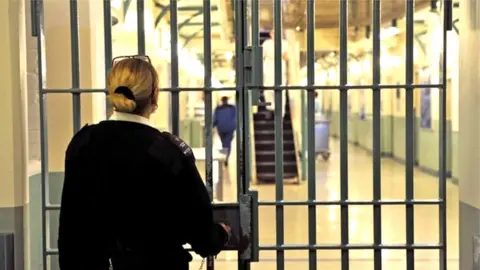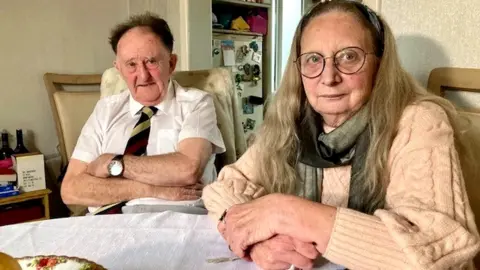Deaths in custody: Prison deaths 'must be investigated within months'
 BBC
BBCEvery death in prison custody should have an independent investigation completed within months of it happening, a new report has said.
The Scottish government ordered the review two years ago after the deaths of four prisoners in just four days.
The independent review said the families of people who died should be involved at every stage and a written report should be made on each death.
It said data must be studied so lessons can be learned to prevent more deaths.
The Scottish government has accepted in principle all of the review's recommendations, saying that a new, independent investigation of every death would complement the current inquiry processes, including Fatal Accident Inquiries.
Adopting this recommendation will bring Scotland in line with England, Wales and Northern Ireland.
The review report said Scotland had one of the highest rates of deaths in prison in Europe and said there needed to be systemic changes to the response to these deaths.
The report followed a recent Glasgow University study which showed that Fatal Accident Inquiries (FAIs) into deaths in custody were often starting three or four years after the incident.
It said that in nine out 10 cases there was no finding of a reasonable precaution and no recommendations to improve practice or prevent death.
The Independent Review into the Response to Deaths in Prison Custody said there was "a noticeable lack of family engagement" at every step on the journey.
It called for a "more humane, compassionate, rights-based response to the loss of life in Scotland's prisons".
 Allan family
Allan familyLinda Allan, whose daughter Katie died in Polmont Young Offenders Institute in 2018, has previously told the BBC she was "flabbergasted" to discover the number of "preventable" deaths in custody, especially among young people.
Ms Allan is still waiting for the FAI into her daughter's death.
Katie took her own life after being sentenced for drink-driving and knocking a 15-year-old boy unconscious.
Lawyer Aamer Anwar issued a statement on behalf of Katie's family and the family of William Lindsay, a 16-year-old who killed himself in Polmont Young offenders' Institution in 2018.
It said the review findings were a "damning indictment" of the Scottish Prison Service.
"For the last three years the families we represent have decried a prison system in crisis that has directly led to deaths. For far too long the SPS has known that no matter how catastrophic their failure in duty of care to prisoners, they will never face justice," it added.
He said the Scottish government had, to date, failed to hold the SPS to account.

'He was a rogue, but he was our rogue... and the prison service forgot that'

Stewart and Liz Taylor's son Maxwell took his own life at HMP Edinburgh in February 2016, just a few weeks before his 33rd birthday. He was on remand, charged with possession of a knife.
Maxwell was a drug user and had been in and out of prison for many years.
Mr and Mrs Taylor told BBC Scotland Maxwell was a "loveable rascal".
Mrs Taylor said: "He was the most devilish lovely child - he really was - but as he progressed he became more and more out of control."
The parents were estranged from Maxwell when he died. A police officer who they knew came to tell them the news and they say they had almost no contact from the prison.
An FAI was held into Maxwell's death two-and-a-half-years after his death.
Mr Taylor said: "We found out four years down the line that there had been a memorial service in Saughton for Maxwell the week after he died, and we knew nothing about it."
His wife added: "We are not talking about why somebody is in prison, we are talking about the fact a family member has died and the families need to be included in any process that comes from that death."

The report into deaths in custody said Scotland had one of the highest imprisonment rates in Northern Europe and one of the highest mortality rates.
It also said deaths in prison had been rising over the past five years. Between 2016 and 2019, the average was 32.5 deaths per year.
The largest cause of death was by natural causes because of the ageing prison population.
However, the report said self‑inflicted death had long been a cause for concern and suicide was the leading cause of death of people under 21.
The review was co-chaired by Wendy Sinclair-Gieben, chief inspector of Her Majesty's Prisons in Scotland, Prof Nancy Loucks, chief executive of Families Outside, and Judith Robertson, who chairs the Scottish Human Rights Commission.
Its other recommendations include:
- The independent investigatory body must have "unfettered access" to all relevant information and access to prisons to interview staff and prisoners
- It must produce and publish reports analysing data on deaths in custody, identifying trends and promoting good practice
- The Scottish Prison Service must be required to retain and produce relevant information
- Families should have access to non-means tested legal aid funding for specialist representation throughout the process
"It is now incumbent on all of those with responsibilities to uphold human rights to take action to implement these recommendations," the report said.
Speaking in the Scottish Parliament on Tuesday, Justice Secretary Keith Brown thanked those who put the report together. He also thanked the families involved in the review.
He said: "Their willingness to revisit the grief they experienced and the insights gained through their participation has made this important work possible.
"We accept in principle the review's recommendations and will very carefully consider the detail of these and take forward, as a matter of priority, improvements with key partners that will effect change to improve the ways that deaths of loved ones in prison custody are experienced by bereaved families.
"This includes the key recommendation of an independent body separately examining every death in custody.
"We are committed to making improvements to the response to, and experiences of, families impacted by a death in custody."
